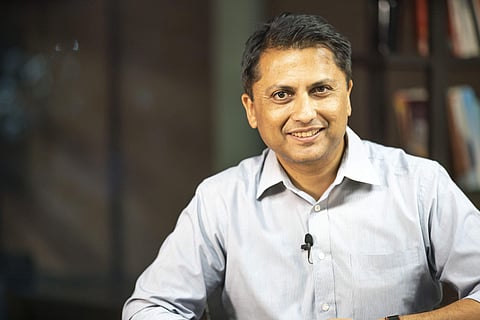

Entrepreneurship is today's game changer. The quickly growing start-up culture has multifold benefits, from creating more jobs to meeting needs and demands of society. While urban India might have the right environment to nurture entrepreneurship, it is not so in rural India. At least, that's what Manav Subodh realised after his interaction with aspiring rural entrepreneurs. That's why he came up with Business Raja, an initiative that aims to mentor and provide access to finance for rural entrepreneurs.
Forty six-year-old Manav, in his decade-long career in the corporate sector, handled entrepreneurship for about 30 countries. The idea was to help young people set up their business and commercialise their technology. It was a typical start-up programme that he had the opportunity to lead. The success of the programme made him wonder: If he could do this for students all around the world, why couldn't he do it for rural India? He says, "My grandfather is from rural India and I grew up with stories about it and I felt that was an area I couldn't contribute much to with my corporate job." With that in mind, he started 1 Million for 1 Billion (1M1B), with the aim to create a million entrepreneurs to impact a billion people.
The initial work involved going to schools, trying to educate kids on entrepreneurship and encouraging them to start businesses instead of looking for jobs. While the impact was good, it was not scalable. Manav and his team soon realised that people in rural areas were capable of learning on their own, the problem was access to funding. So in 2019, they moved the focus of their programme from skilling entrepreneurship to bringing access to finance, and renamed the initiative Business Raja.
He says, "One of the challenges we saw was that it is not the skilling. The biggest gap is mentoring and access to finance. They have the ideas, they know the market, they know the math. We underestimate them and think they need to be educated on entrepreneurship. But they don't need that. So we just focus on what they require, which is access to finance and mentoring on confidence building, how to approach a bank, how to make a presentation to government authorities and so on. We also wanted to ensure these entrepreneurs are able to stay where they are, with their families. Given a chance, they don't want to move out because they can obviously save more and their quality of life is better." Business Raja has helped 1,200 entrepreneurs across Andhra Pradesh, Karnataka and Tamil Nadu so far.
So how does the process work? It begins with rural shark tanks where volunteers and staff first advertise the programme, then scout for ideas. People are given the opportunity to pitch their start-up ideas. Once the best candidates are selected, the team handholds them and helps them get access to finance. "We tell them how to get their credit scores up. We are fund-raising for a lot of them ourselves, through crowdfunding and corporates, because the banks have to work within the system and it was difficult for us to get the banks to trust them and give them loans. We started a small grant of `50,000 per start-up just to help them get started," he says.
With over 6,80,000 villages in India, helping build rural entrepreneurship is a humongous task and Manav believes that the only solution is to engage young people, especially students. Which is why he simultaneously started Purpose Academy where students from urban areas are educated on what is happening in rural India. Manav says, "We are mobilising young people to solve this problem. They do it as internships or summer programmes, they do the campaigning, fundraising and even the shark tanks." Business Raja has helped provide close to `1 crore as funds to these entrepreneurs, including the funds they raised on their own and loans from the banks.
